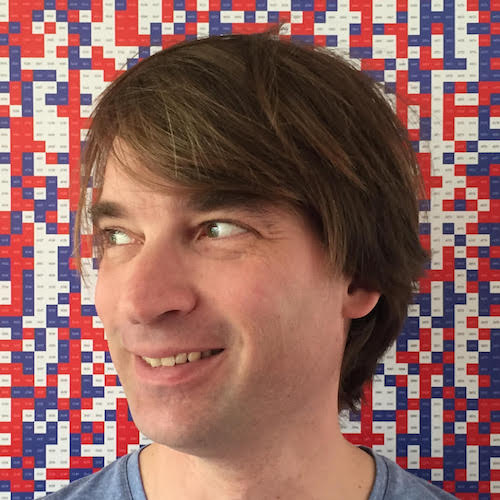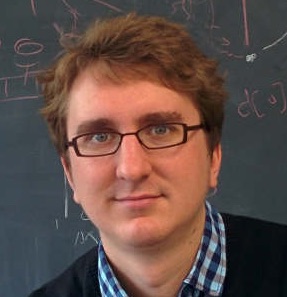GCAI will feature three invited talks. The speakers are:
Catherine Pelachaud, CNRS-ISIR, University Pierre and Marie Curie, France
TITLE: Modelling Conversing Social Agents
ABSTRACT: I will present several of our works regarding modeling social and emotional behaviors for embodied conversational agents. Lately we have used methods that rely on corpus analysis. We have gathered a corpus of more than 80 dyads. This corpus is annotated on different levels, high level such as impression of competence or social attitude, and multimodal behaviors. By applying sequences mining we extract behavior patterns involved in the change of perception of an attitude or competences. In this talk I will also present our work on simulating group of agents interacting with each other. In particular I will describe the turn-taking management mechanisms we have developed that take into account social attitude agents have toward each other.
SHORT BIO: Catherine Pelachaud is a Director of Research at CNRS in the laboratory ISIR, University of Pierre and Marie Curie. Her research interest includes embodied conversational agent, nonverbal communication (face, gaze, and gesture), expressive behaviors and socio-emotional agents. She is associate editors of several journals among which IEEE Transactions on Affective Computing, ACM Transactions on Interactive Intelligent Systems and Journal on Multimodal User Interfaces. She has co-edited several books on virtual agents and emotion-oriented systems. She is recipient of the ACM – SIGAI Autonomous Agents Research Award 2015. Her Siggraph’94 paper received the Influential paper Award of IFAAMAS (the International Foundation for Autonomous Agents and Multiagent Systems).

Marijn Heule, University of Texas at Austin, USA
TITLE: Everything's Bigger in Texas: "The Largest Math Proof Ever"
ABSTRACT: Many search problems, from artificial intelligence to combinatorics, explore large search spaces to determine the presence or absence of a certain object. These problems are hard due to combinatorial explosion, and have traditionally been called infeasible. The brute-force method, which at least implicitly explores all possibilities, is a general approach to search systematically through such spaces. Brute force has long been regarded as suitable only for simple problems. This has changed in the last two decades, due to the progress in satisfiability (SAT) solving, which renders brute force into a powerful approach to deal with many problems easily and automatically. We illustrate the strength of SAT via the Boolean Pythagorean Triples problem, which has been a long-standing open problem in Ramsey Theory. Our parallel SAT solver allowed us to solve the problem on a cluster in about two days using 800 cores, demonstrating its linear time speedup on many hard problems. Due to the general interest in this mathematical problem, our result requires a formal proof. Exploiting recent progress in unsatisfiability proof checking, we produced and verified a clausal proof of the smallest counterexample, which is almost 200 terabytes in size. These techniques show great promise for attacking a variety of challenging problems arising in mathematics and computer science.
SHORT BIO: Marijn Heule is a Research Scientist at the University of Texas at Austin. He received his PhD (2008) at Delft University of Technology in the Netherlands. His research focuses on automatically solving hard problems in areas such as formal verification and mathematics. Most of his contributions are related to theory and practice of satisfiability (SAT) solving. He has developed award-winning SAT solvers, and his preprocessing techniques are used in most state-of-the-art SAT solvers. Articles on his parallel solver received best paper awards at the HVC'11 and SAT'16 conferences.

Guy van den Broeck, University of California Los Angeles, USA
TITLE: Open-World Probabilistic Databases
ABSTRACT: Large-scale probabilistic knowledge bases are becoming increasingly important in academia and industry alike. They are constantly extended with new data, powered by modern information extraction tools that associate probabilities with database tuples. In this talk, we revisit the semantics underlying such systems. In particular, the closed-world assumption of probabilistic databases, that facts not in the database have probability zero, clearly conflicts with their everyday use. To fix this discrepancy, we propose an open-world probabilistic databases semantics, which relaxes the probability of open facts to intervals. While still assuming a finite domain, this semantics can provide meaningful answers when some probabilities are not precisely known. For this open-world setting, we propose an efficient evaluation algorithm for unions of conjunctive queries. Our open-world algorithm incurs no overhead compared to closed-world reasoning and runs in time linear in the database size for tractable queries. Finally, we discuss limitations and additional knowledge-representation layers that can further strengthen open-world reasoning about big uncertain data, as well as connections to lifted probabilistic inference algorithms and statistical relational learning.
SHORT BIO: Guy van den Broeck is an Assistant Professor and Samueli Fellow at UCLA, in the Computer Science Department, where he directs the Statistical and Relational Artificial Intelligence (StarAI) lab. His research interests are in Machine Learning (Statistical Relational Learning, Tractable Learning), Knowledge Representation and Reasoning (Graphical Models, Lifted Probabilistic Inference, Knowledge Compilation), Applications of Probabilistic Reasoning and Learning (Probabilistic Programming, Probabilistic Databases), and Artificial Intelligence in general.
